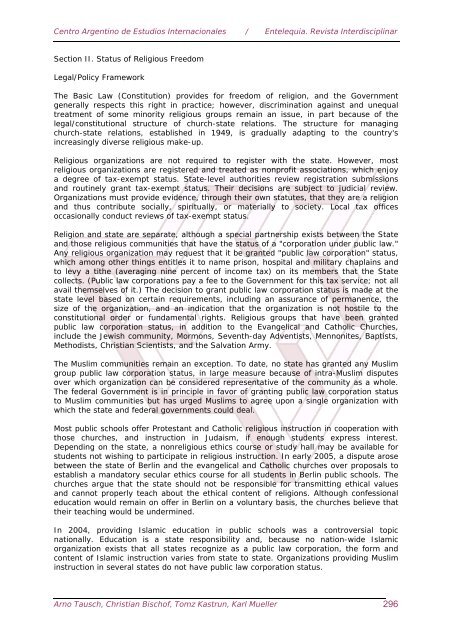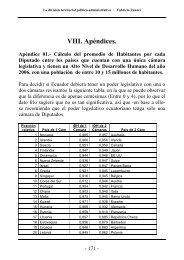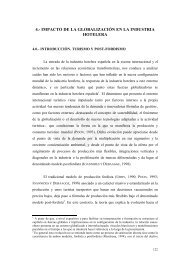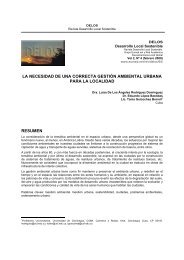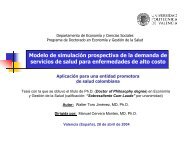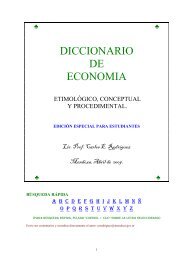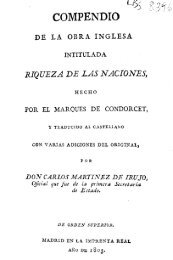Download the full book in PDF format - Eumed.net
Download the full book in PDF format - Eumed.net
Download the full book in PDF format - Eumed.net
You also want an ePaper? Increase the reach of your titles
YUMPU automatically turns print PDFs into web optimized ePapers that Google loves.
Centro Argent<strong>in</strong>o de Estudios Internacionales / Entelequia. Revista Interdiscipl<strong>in</strong>ar<br />
Section II. Status of Religious Freedom<br />
Legal/Policy Framework<br />
The Basic Law (Constitution) provides for freedom of religion, and <strong>the</strong> Government<br />
generally respects this right <strong>in</strong> practice; however, discrim<strong>in</strong>ation aga<strong>in</strong>st and unequal<br />
treatment of some m<strong>in</strong>ority religious groups rema<strong>in</strong> an issue, <strong>in</strong> part because of <strong>the</strong><br />
legal/constitutional structure of church-state relations. The structure for manag<strong>in</strong>g<br />
church-state relations, established <strong>in</strong> 1949, is gradually adapt<strong>in</strong>g to <strong>the</strong> country's<br />
<strong>in</strong>creas<strong>in</strong>gly diverse religious make-up.<br />
Religious organizations are not required to register with <strong>the</strong> state. However, most<br />
religious organizations are registered and treated as nonprofit associations, which enjoy<br />
a degree of tax-exempt status. State-level authorities review registration submissions<br />
and rout<strong>in</strong>ely grant tax-exempt status. Their decisions are subject to judicial review.<br />
Organizations must provide evidence, through <strong>the</strong>ir own statutes, that <strong>the</strong>y are a religion<br />
and thus contribute socially, spiritually, or materially to society. Local tax offices<br />
occasionally conduct reviews of tax-exempt status.<br />
Religion and state are separate, although a special partnership exists between <strong>the</strong> State<br />
and those religious communities that have <strong>the</strong> status of a "corporation under public law."<br />
Any religious organization may request that it be granted "public law corporation" status,<br />
which among o<strong>the</strong>r th<strong>in</strong>gs entitles it to name prison, hospital and military chapla<strong>in</strong>s and<br />
to levy a ti<strong>the</strong> (averag<strong>in</strong>g n<strong>in</strong>e percent of <strong>in</strong>come tax) on its members that <strong>the</strong> State<br />
collects. (Public law corporations pay a fee to <strong>the</strong> Government for this tax service; not all<br />
avail <strong>the</strong>mselves of it.) The decision to grant public law corporation status is made at <strong>the</strong><br />
state level based on certa<strong>in</strong> requirements, <strong>in</strong>clud<strong>in</strong>g an assurance of permanence, <strong>the</strong><br />
size of <strong>the</strong> organization, and an <strong>in</strong>dication that <strong>the</strong> organization is not hostile to <strong>the</strong><br />
constitutional order or fundamental rights. Religious groups that have been granted<br />
public law corporation status, <strong>in</strong> addition to <strong>the</strong> Evangelical and Catholic Churches,<br />
<strong>in</strong>clude <strong>the</strong> Jewish community, Mormons, Seventh-day Adventists, Mennonites, Baptists,<br />
Methodists, Christian Scientists, and <strong>the</strong> Salvation Army.<br />
The Muslim communities rema<strong>in</strong> an exception. To date, no state has granted any Muslim<br />
group public law corporation status, <strong>in</strong> large measure because of <strong>in</strong>tra-Muslim disputes<br />
over which organization can be considered representative of <strong>the</strong> community as a whole.<br />
The federal Government is <strong>in</strong> pr<strong>in</strong>ciple <strong>in</strong> favor of grant<strong>in</strong>g public law corporation status<br />
to Muslim communities but has urged Muslims to agree upon a s<strong>in</strong>gle organization with<br />
which <strong>the</strong> state and federal governments could deal.<br />
Most public schools offer Protestant and Catholic religious <strong>in</strong>struction <strong>in</strong> cooperation with<br />
those churches, and <strong>in</strong>struction <strong>in</strong> Judaism, if enough students express <strong>in</strong>terest.<br />
Depend<strong>in</strong>g on <strong>the</strong> state, a nonreligious ethics course or study hall may be available for<br />
students not wish<strong>in</strong>g to participate <strong>in</strong> religious <strong>in</strong>struction. In early 2005, a dispute arose<br />
between <strong>the</strong> state of Berl<strong>in</strong> and <strong>the</strong> evangelical and Catholic churches over proposals to<br />
establish a mandatory secular ethics course for all students <strong>in</strong> Berl<strong>in</strong> public schools. The<br />
churches argue that <strong>the</strong> state should not be responsible for transmitt<strong>in</strong>g ethical values<br />
and cannot properly teach about <strong>the</strong> ethical content of religions. Although confessional<br />
education would rema<strong>in</strong> on offer <strong>in</strong> Berl<strong>in</strong> on a voluntary basis, <strong>the</strong> churches believe that<br />
<strong>the</strong>ir teach<strong>in</strong>g would be underm<strong>in</strong>ed.<br />
In 2004, provid<strong>in</strong>g Islamic education <strong>in</strong> public schools was a controversial topic<br />
nationally. Education is a state responsibility and, because no nation-wide Islamic<br />
organization exists that all states recognize as a public law corporation, <strong>the</strong> form and<br />
content of Islamic <strong>in</strong>struction varies from state to state. Organizations provid<strong>in</strong>g Muslim<br />
<strong>in</strong>struction <strong>in</strong> several states do not have public law corporation status.<br />
Arno Tausch, Christian Bischof, Tomz Kastrun, Karl Mueller 296


